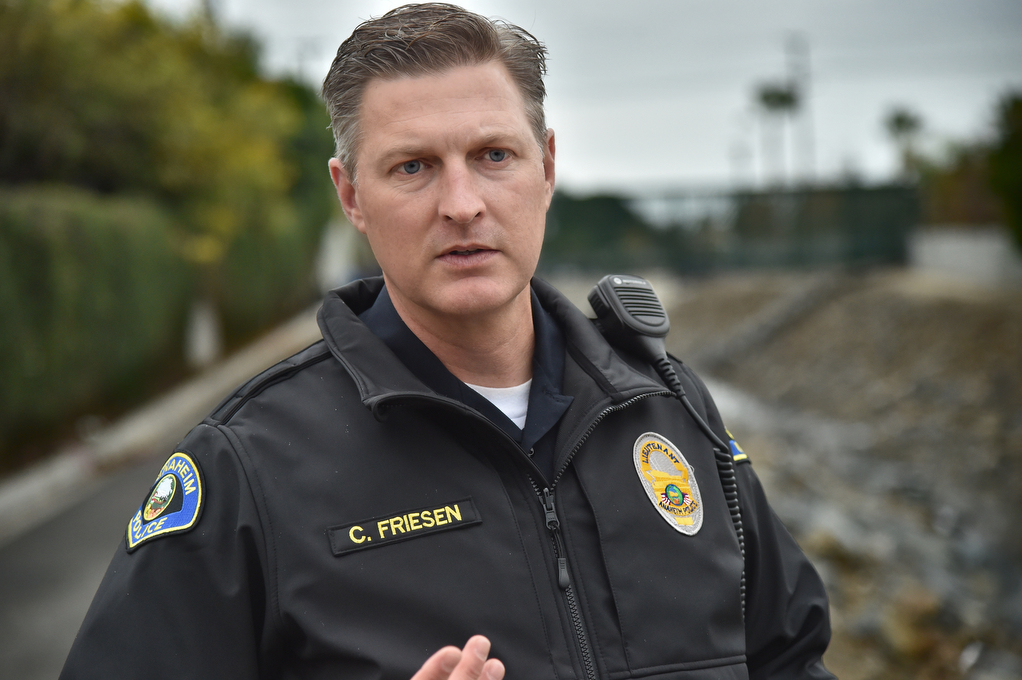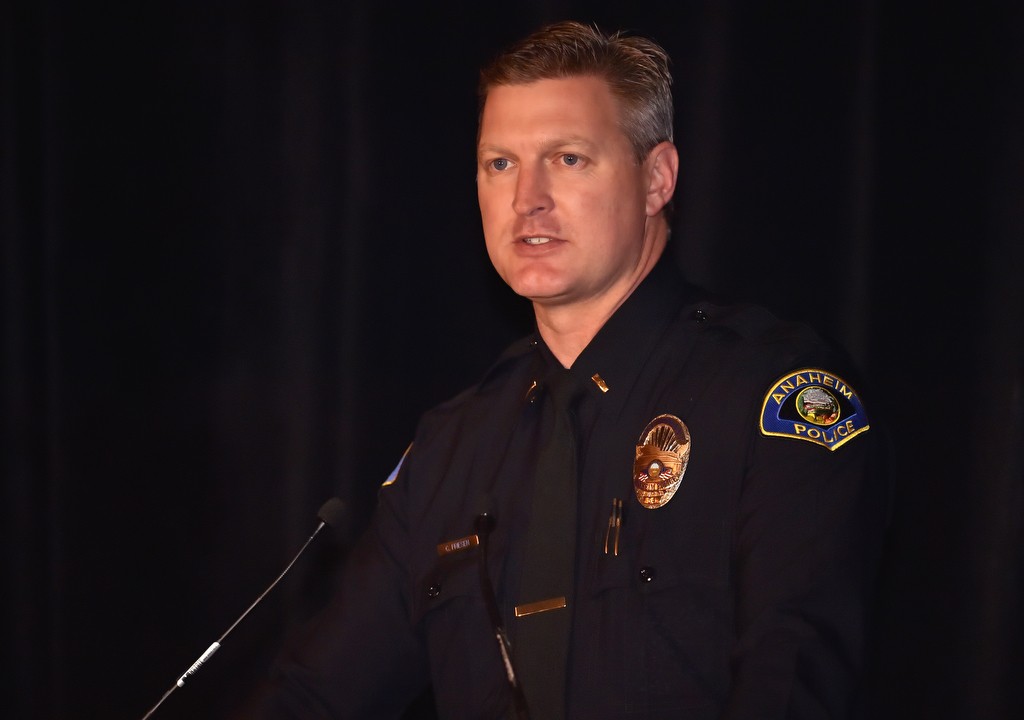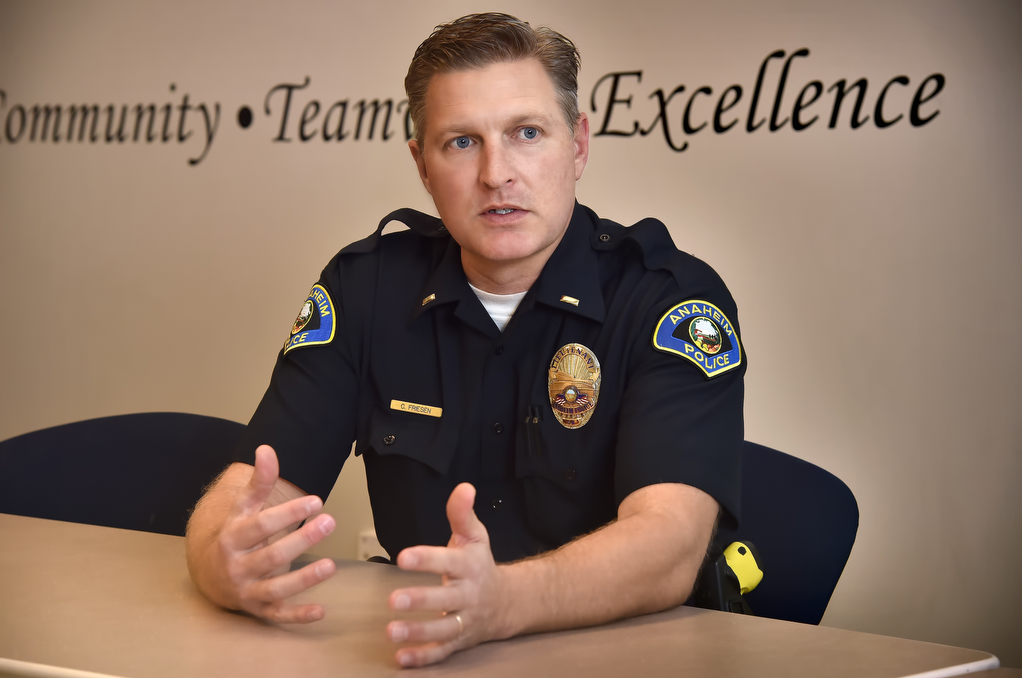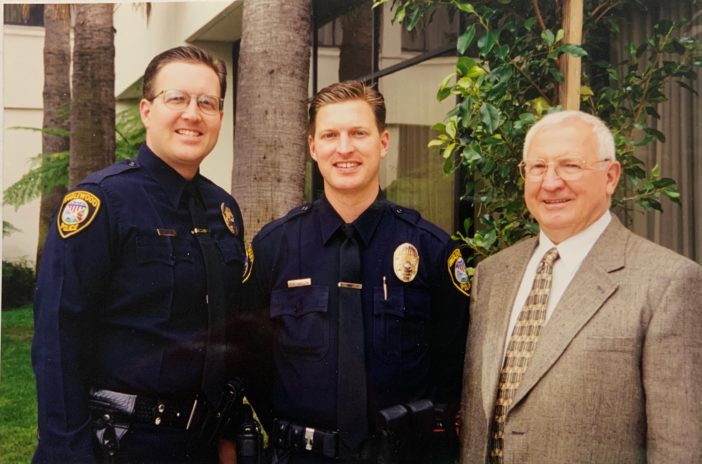It’s tempting to say Craig Friesen of the Anaheim Police Department wrote the book on how to police human trafficking. And it’s not that much of a stretch.
The police veteran, now a captain, was in the vanguard of police that led a sea change in how law enforcement viewed and handled prostitution. They helped lift consciousness about the crime as more than just a victimless street crime; that many of the women working the streets were unwilling victims forced into the trade by pimps and handlers.
“We really changed the way police departments approach human trafficking and the way we approach young men and women,” Friesen said. “There’s an entire generation that’s been forced into prostitution.”
Much of the work Friesen and the other California cops was shared with the FBI and helped inform policy.
“We went up and down the state,” Friesen said of a campaign to inform and consult with other police. “We changed the focus of arresting victims to focusing on the offender who made them work in human trafficking.”

Captain Craig Friesen of the Anaheim Police Department. Photo provided by the Anaheim Police Department
The work earned Friesen recognition from the popular crime-prevention TV show “America’s Most Wanted.”
Friesen’s older brother, Pete, who recently retired from the Inglewood Police Department, said whenever groups hear talks on human trafficking now, much of the information comes from the work his brother and his compatriots did.
“Or they stole his syllabus,” Pete Friesen jokes.
“We put ourselves out on a limb,” the younger Friesen said. “D.A.’s offices changed the way they filed and prosecuted cases.”
Friesen is modest about his accomplishments, saying, “Sometimes you end up in the right spot and cross paths with the right people.”
Riding captain’s desk
These days, Friesen sits in a captain’s chair and helps shape policy and practice in a different way.
“My view of the department has broadened,” he said, noting that in addition to fellow officers and staff, he is also responsible and answers to citizens and politicians.
Friesen works in administration, overseeing personnel, budget, internal affairs and public administration. He is one of four captains in the Anaheim Police Department directly beneath the chief and deputy chief of police.

Anaheim Police Lt. Craig Friesen talks about the relocation of the homeless people who were camping at Maxwell Park and Schweitzer Park in Anaheim in this file photo from 2019.
File photo by Steven Georges/Behind the Badge
He received the promotion on Halloween day in 2019.
“Better than April Fool’s,” he jokes.
After 26 years as a cop on the streets, Friesen said of desk work, “I’ve enjoyed it. There has definitely been a learning curve.”
Friesen was elevated to full-time captain after a four-month stint as acting captain. He also also completed the FBI National Academy course.
He said one of the hardest parts of transitioning from on-the-street cop is going from being a doer to a planner.
“My goal is to make (police work) as fun as possible,” he said. “I was blessed to have great mentors and teachers. (Anaheim) is a really good department. I want to make it a good place to work.”
Doing the job the right way
Friesen hopes that his hard work in every level of the department will earn him respect from rank-and-file cops, “because I’ve tried to earn it at every level. You have to have the proven track record for people to believe you and want to follow you.”
In addition to his work in trafficking, Friesen is proudest of his two years as a sergeant with the street narcotics unit.

Anaheim Police Lt. Craig Friesen during the 12th Annual Community First Conference in this photo from 2016.
File photo by Steven Georges/Behind the Badge
It’s not just the busts and the recovery of drugs, guns and money that he points to.
“We had just one complaint during that time, and we took a lot of people to jail,” he said. “To do all that with one complaint is something. It shows there’s a way to do police work right.”
Friesen is less than two years from retirement and surely will face challenges in that time. One will be the budget as the after-effects of the coronavirus settle, particularly in a city like Anaheim that saw its prime industry, entertainment, decimated.
“There’s no hiding from the fiscal impact,” he said. “This city is dependent on TOT (transient occupancy tax). They drive the city. Now more than ever it’s important to be fiscally responsible. I trust the City Council to do what’s right, but it will be a tough time for some of our employees. It would be naive not to think it will have a major impact on our finances. We went through 2008-2009 and we rebounded. People have powered through and kept working despite everything.”
Coming up through Inglewood
Friesen joined the Anaheim Police Department in 1999 after five years with the Inglewood Police Department.
In Inglewood he served alongside his brother, Pete, both following the steps of their dad, who spent his entire career in the Inglewood PD, retiring as a lieutenant in 1991.
Despite the comfort of working in his hometown and the family connections, Friesen said he was looking for new challenges.
“I was just looking to make my own path,” he said. “I wanted to prove myself somewhere else.”

Anaheim Police Lt. Craig Friesen talks about the relocation of the homeless who were camping at Maxwell Park and Schweitzer Park in Anaheim in this photo from 2019.
File photo by Steven Georges/Behind the Badge
Pete Friesen said Anaheim provided his brother with more avenues to advance.
“In Inglewood you go to a specialized unit and you can be a lifer,” Pete said. “He was looking for opportunities with a bigger organization.”
Among Friesen’s assignments in Anaheim, he has been a lieutenant with the homeless outreach and psychiatric emergency response teams and the West District policing team.
He was also a lieutenant with internal affairs and its major incident review team. He led field training for the department and has been a watch commander.
After joining Anaheim as a patrolman, and working as a gang investigator, Friesen was promoted to sergeant.
He has a master’s degree in criminal justice from California Coast University and received his undergraduate degree from Cal State Long Beach.
“I never thought of promotion past sergeant,” Friesen said. “I had great sergeants and that was the only promotion I sought.”
Advancing to lieutenant and captain grew out of a desire, he said, “to be able to leave (the Anaheim Police Department) as a greater organization than when I joined.”
Friesen credits his wife, Tami, for “doing the heavy lifting” of keeping his family together and raising the couple’s two kids through the hectic life of being a law enforcement family.
Friesen said he has kept his sanity from trying to disconnect from cop life in his off time and through coaching high school lacrosse teams. He hopes he can continue coaching in retirement.
Sibling rivalry
Growing up with an older brother in whose tracks he followed came not only with healthy competition but some good-natured (usually) ribbing.
Pete Friesen says when he introduces his brother, he also apologizes for Craig’s behavior and for not beating him up enough when they were growing up.
“I always made fun of my brother, that he followed everything I did,” Pete Friesen said. “He followed me in high school, followed me into police cadets and the police force. I got promoted before he did. I made sergeant.”
Then the older brother hesitates.
“This is where he became the successful Friesen,” Pete Friesen said, almost wistfully. “But I still have him beat because I retired and he’s still working.”
As a coda he adds, “but he’s the best police officer I know.”
 Behind the Badge
Behind the Badge



